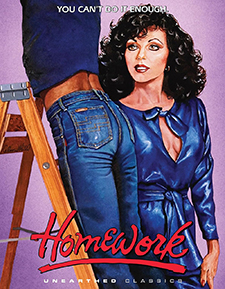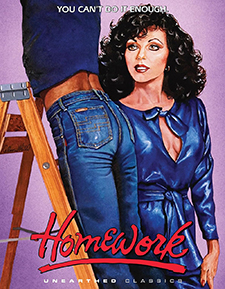Homework (1982) (Blu-ray Review)

Director
James BeshearsRelease Date(s)
1982 (June 25, 2024)Studio(s)
Jensen Farley Pictures (Unearthed Classics/Unearthed Films)- Film/Program Grade: D
- Video Grade: B-
- Audio Grade: B+
- Extras Grade: B-
Review
“Horny Teenagers” was a bona fide movie genre phenomenon in the late-1970s/early ‘80s, a period long before the Internet, when cable television and home video were still in their infancy, beyond the reach of most 16-20-year-olds. Hot-blooded teenagers yearning to see bare-breasted young women and hot-and-heavy scenes of teenagers making out were pretty much limited to these R-rated sex comedies. Thanks to the rise of multiplex theaters, it was relatively easy to circumvent MPAA restrictions; one could buy a ticket for a PG-rated release, and after a few minutes quietly sneak over to the R-rated picture and its forbidden fruits.
The earliest Horny Teenager movies tended to be low-budget exploitation affairs, but the success of director Bob Clark’s Porky’s (1981), made outside of Hollywood as a Canadian tax shelter production for less than $4 million, became an enormous international hit, grossing at least $160 million, 40 times its cost. Hollywood studios, always first to be second, jumped on the bandwagon, though these slightly more expensive films generally weren’t any better than the cheap ones. Amy Heckerling’s Fast Times at Ridgemont High (1982), with its screenplay by Cameron Crowe, was an exception, today generally regarded as the high-water mark of its genre.
Conversely, Homework, released in 1982 but shot much earlier, c. 1979, is among the very worst, but it’s not without interest. For one thing, in many respects it presages many of the qualities of Fast Times, if clumsily so, and this is thwarted some by major reediting by other hands. It features Joan Collins, then at the nadir of her long career, in a very minor role, but when she enjoyed a major comeback on the hit prime time soap Dynasty, which premiered in January 1981, the producers reworked the film to beef up her part, and created a nude scene for her character using a body double. This may have helped the film commercially, but it wreaks havoc on the film’s mildly interesting original narrative.
The rather schematic plot revolves more or less around high school student Tommy (Michael Morgan), who a) wants to organize a rock band (“You want to be in the hottest new group since KISS?”), and; b) is feeling anxious because, unlike his peers—so he thinks—he hasn’t lost his virginity. Not helping matters is his girlfriend, Sheila (Erin Donovan), obsessed with improving her time for an upcoming swim meet, is spending all her free-time in the pool practicing instead of making out with him. Between fantasizing about sex, he visits school psychologist Dr. Delingua (Carrie Snodgrass), looking for a cure.
Meanwhile, Tommy’s band gradually comes together, with classmates Ralph (Lanny Horn), Lisa (Shell Kepler), and Cookie (Renée Harris). Ralph, for his part, believes his incompetent French teacher, Ms. Jackson (Lee Purcell) is coming on to him, inviting him to her house for supplementary lessons; Lisa thinks rock star Reddog (Wings Hauser) wants to audition her for his band but is really only interested in having sex with her; and Cookie is exploring her sexuality while dodging her super-strict father.
Though top-billed, Joan Collins, as Diana, the mother of one of the kids, is very minor; she was paid $25,000 and her part was probably filmed in a single day. In scenes shot for the film as originally conceived, near the end Tommy stops by her house to use her phone and she enlists his help hanging a picture, she subtly lusting after his body, looking at his behind while he’s up on a ladder. After Dynasty took off, an allegedly steamy love scene was shot using a body double for Collins (substituting freckly Joy Michael, who doesn’t much resemble Collins). Further, additional scenes not in the original script were added to beef up the character’s presence. In several flashbacks, Diana’s own teenage sexcapades (also featuring Joy Michael) are dramatized.
That Collins ending up being top-billed for her tiny part and that she alone appeared, scantily-dressed, on the poster art displeased the actress, then riding high on her newfound TV fame. The day before the picture opened she filed a lawsuit against the producers, joined by Purcell, Snodgrass, and Betty Thomas (appearing briefly as Reddog’s secretary) to get their names removed from the credits and charging “fraud, breach of contract, intentional infliction of emotional distress and exploitation of name and likeness.” Collins argued what was obvious to all, that her small part did not justify her misleading top billing or prominence in the advertising, and that added scenes with the double violated the terms of the original contract.
Less believable were the objections of Purcell, Snodgrass, and Thomas, they alleging they were misled about the nature of the film, Snodgrass claiming she did the role gratis after being told her scenes were for an educational film whose distribution was limited to public high schools. Purcell’s suggestive (but not explicit) scenes are clearly the stuff of teen sex comedy, while Thomas’s role is so insignificant one can only wonder why she bothered to join the lawsuit. (She soon dropped out.) An out-of-court settlement was eventually reached, and the advertising altered so that Collins’s semi-nude appearance on the poster art was changed to an image of her fully-clothed.
The cynical shoehorning of these scenes disrupt what modest assets Homework has. Some of the teen interaction material is not terrible, Tommy and company discussing their ambitions, their confusions about sexual relationships, etc. The young actors are generally good: Michael Morgan may have been the son of actress Yvonne De Carlo and stuntman Bob Morgan (this is likely but I’ve been unable to confirm this); he worked steadily on TV during the ‘70s but died in 1999 at 39. Shell Kepler had a 400-plus episode run on the soap opera General Hospital but she, too, died young, in 2008 at 49. The appealing Erin Donovan and Lanny Horn both quit acting and became writers. All the changes also apparently altered some of the music scoring, more integral to the original cut.
It’s a shame Homework was so clumsily altered. It probably wouldn’t haven’t made the picture that much better, but perhaps enough to keep it from being the mostly terrible offering it is. It capture its time and place better than a lot of late-‘70s pictures. There’s some interesting location work around Los Angeles’s red-light areas, and one scene (probably stolen) is shot in the forecourt of the pre-restored Egyptian Theater on Hollywood Boulevard.
Unearthed Film’s Blu-ray of Homework is not very impressive. In 1.85:1 widescreen, the film seems scanned from something other than the original negative, possibly even a clean theatrical print but more likely an internegative. On the other hand, giving all the retooling done by the producers, it may reflect the original theatrical prints, but it is grainy and soft at once. LPCM 2.0 mono is the primary soundtrack, though a Dolby Digital 2.0 stereo remix is offered, along with optional English subtitles on this Region “A” encoded release.
Repurposed extras from an earlier release include a 30-minute interview by Dennis Bartok with executive (and unbilled) producer Max Rosenberg, who died in 2004; a gallery of advertising art, and a trailer.
Homework is not a good film by any means, but neither is it unwatchable junk, not quite. It’s kind of intriguing for its opportunistic retooling and the legal battle it spawned, but unless you have a fondness for such films, you won’t be missing anything by skipping it.
- Stuart Galbraith IV

